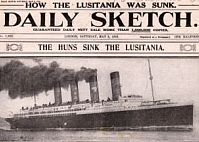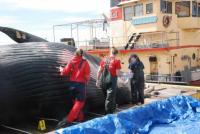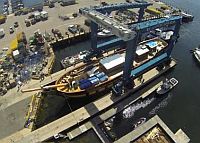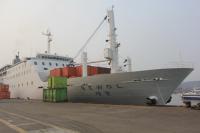 When the Cunard liner RMS Lusitania was sunk by a German submarine during World War I, on May 7, 1915, with the loss of 1,198 passengers and crew, the Germans claimed that the ship was carrying high explosives, which the British vehemently denied. The British later admitted that the ship was carrying 4,200 cases of small arms cartridges. In 1918, a New York judge ruled that that these did not constitute “war munitions”. The sinking of the ship was used by the British army for recruiting purposes, particularly in Ireland, and was crucial in swaying public opinion in the US in favor of declaring war against Germany. Newly released documents, however, raise questions about what may have been aboard the ship when she was torpedoed.
When the Cunard liner RMS Lusitania was sunk by a German submarine during World War I, on May 7, 1915, with the loss of 1,198 passengers and crew, the Germans claimed that the ship was carrying high explosives, which the British vehemently denied. The British later admitted that the ship was carrying 4,200 cases of small arms cartridges. In 1918, a New York judge ruled that that these did not constitute “war munitions”. The sinking of the ship was used by the British army for recruiting purposes, particularly in Ireland, and was crucial in swaying public opinion in the US in favor of declaring war against Germany. Newly released documents, however, raise questions about what may have been aboard the ship when she was torpedoed.
In documents from 1982 released on Thursday by the Foreign Office from the British National Archives at Kew, Noel Marshall, the head of the Foreign Office’s North America department, expressed concerns that a proposed salvage operation on the wreck of the Lusitania could still “literally blow up on us”. Continue reading →


 I was saddened to hear of
I was saddened to hear of  Fin and sei whale are not usually seen in New York’s upper harbor, yet in a period of less than a month, two have made an appearance. Unfortunately, both were dead, pinned to the bows of ships.
Fin and sei whale are not usually seen in New York’s upper harbor, yet in a period of less than a month, two have made an appearance. Unfortunately, both were dead, pinned to the bows of ships. The
The Update: The dead whale is now identified as a
Update: The dead whale is now identified as a  The Norwegian Breakway is one year old this week. Unfortunately, it wasn’t a particularly auspicious birthday. As the cruise ship entered New York harbor yesterday, after a seven day cruise, the captain reported some sort of problem related to the ship’s azipods, which prevented it from docking. Like most new cruise ships, the 1,068-foot Norwegian Breakway, which can carry 3,969 guests plus its crew of 1,651, does not have conventional shaft mounted propellers or rudders. Instead, it is powered by propellers mounted on streamlined pods, which can rotate, and therefore also serve as the ship’s rudders. The ship also has three bow thrusters.
The Norwegian Breakway is one year old this week. Unfortunately, it wasn’t a particularly auspicious birthday. As the cruise ship entered New York harbor yesterday, after a seven day cruise, the captain reported some sort of problem related to the ship’s azipods, which prevented it from docking. Like most new cruise ships, the 1,068-foot Norwegian Breakway, which can carry 3,969 guests plus its crew of 1,651, does not have conventional shaft mounted propellers or rudders. Instead, it is powered by propellers mounted on streamlined pods, which can rotate, and therefore also serve as the ship’s rudders. The ship also has three bow thrusters. It is not always easy to decipher the news being reported on the tragic sinking of the Korean ferry Sewol , which capsized in the Yellow Sea on April 16, leaving more than 300 dead or missing. There have been numerous reports that the ferry was overloaded when she sank, yet by all indications, the likely problem was that the ship had inadequate stability. The ferry sank while under the command of a relief captain. Last week the
It is not always easy to decipher the news being reported on the tragic sinking of the Korean ferry Sewol , which capsized in the Yellow Sea on April 16, leaving more than 300 dead or missing. There have been numerous reports that the ferry was overloaded when she sank, yet by all indications, the likely problem was that the ship had inadequate stability. The ferry sank while under the command of a relief captain. Last week the  Last August we asked “
Last August we asked “ When the Cunard liner
When the Cunard liner  Update:
Update:  This year, the
This year, the  Would the world’s first purpose-built oceangoing roll-on/roll-off ship make a good museum? The
Would the world’s first purpose-built oceangoing roll-on/roll-off ship make a good museum? The 
 We have noted before the paradox of ocean shipping — it is simultaneously the most energy efficient means of transportation with the lowest carbon footprint while at the same time, it is a major polluter. (See our post from back in 2010 —
We have noted before the paradox of ocean shipping — it is simultaneously the most energy efficient means of transportation with the lowest carbon footprint while at the same time, it is a major polluter. (See our post from back in 2010 —  For roughly fifty years, scientists have listened to an unidentified sound in the Southern Ocean, which has been described as a sort of mechanical quacking noise. It has been come to be known as the
For roughly fifty years, scientists have listened to an unidentified sound in the Southern Ocean, which has been described as a sort of mechanical quacking noise. It has been come to be known as the  The death toll in the sinking of the
The death toll in the sinking of the